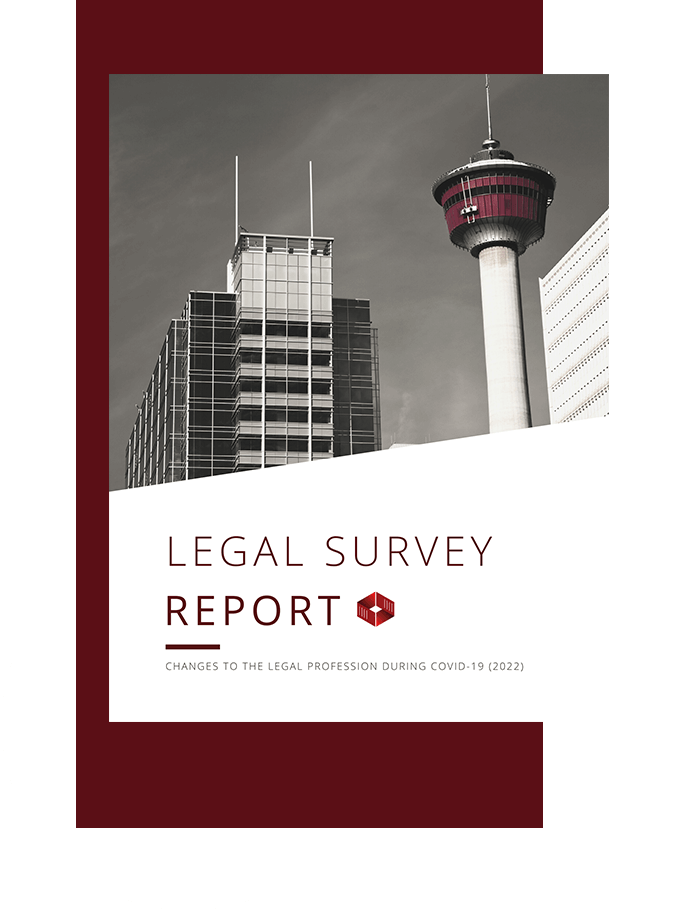
Buying Guide — Legal Software Purchase
Over the summer, we published a series of blog posts focused on the benefits and challenges related to providing a reliable and employee-centred remote experience, while ensuring that your firm's interests are still served.
WFH and hybrid work arrangements were shown to be incredibly popular in our 2022 Legal Survey:
- Over four in five law firm employees worked from home in some capacity during the Covid-19 Pandemic.
- Approximately 95% of those surveyed who had worked remotely hoped that these arrangements would continue.
- Flexibility from the employer's side with regard to remote work is highly correlated with an employee giving their firm a five-star rating.
- An employee who rated their firm five stars is 40% more likely to state clearly that they are not interested in making a change to their career than those rating their firm four stars and below.
One of the clear points that emerged from both our survey and our conversations with clients and webinar viewers over the course of the summer was that proper deployment of technology in support of those working from home is absolutely essential, but many felt they had neither the time nor the best understanding of how to choose new technology from among the myriad options out there.
Over the course of our next four blog posts, we aim to offer a guide for selecting, purchasing, and implementing technology in your firm.
In this first post in our series, we will introduce the subject by asking the question: Why is well-selected, properly-implemented technology so important to a law firm?
The Importance of Technology
Retain and Attract Talented Employees
In our 2022 Legal Survey, five-star firms were 64% more likely than others to bring in new technology. Firms rated five stars were 40% more likely to have employees who answered that they were not thinking about making a change to their employment or career. Keeping good employees is the foundation of building a great team.
Offering remote work also allows a firm to attract and build on that foundation. We have spoken to many legal recruiters who say that top talent will no longer even consider working for a firm that will not permit at least a hybrid work arrangement. Additionally, a robust remote work ability theoretically allows a firm to hire employees anywhere in their province, and possibly anywhere within the country, significantly increasing the firm's search radius when looking to fill a position.
Technology is the foundation of a reliable remote work environment. Lack of necessary technology, lack of training, and unreliable technology all correlated heavily with morale issues and loss of productivity.
Gain a Competitive Edge
Use of technology allows a firm to gain a competitive advantage over their competitors. Technology can be used to automate, centralize, and reduce many repetitive, time-consuming, and non-revenue-producing tasks. Consider the following two examples:
Example 1
Firm A and Firm B both do 100 conveyances per month. Firm A uses
conveyancing software, which automates much of the process and reduces
errors. Firm B does not. Firm A is able to employ fewer support staff
to complete the same amount of work as Firm B, and is, therefore, able
to lower their price or put more money on their bottom line.
Example 2
Firm A and Firm B both specialize in Motor Vehicle Accident
litigation. Firm A uses cost recovery software, recovering
substantially more of their office costs than Firm B. Firm A uses this
extra cash flow for advertising, which begins to eat into Firm
B's business
Reduce Errors
Errors in a law firm can be time consuming, deeply embarrassing, and ultimately very costly. Most legal software is designed to reduce errors. For instance, Tracument's Request Automator will remind your staff to follow up with a doctor's office if a request for records has not been received, even if that staff member has forgotten or failed to set a reminder themselves. Likewise, your accounting software may save your bookkeeper from making an improper transaction by warning them (or even preventing the transaction).
Additionally, software does not (by itself) make mistakes, and thus provides a much more reliable quality of information to its users. Not sure if documents have been sent to opposing counsel? You can use the chain-of-custody tracking available with Tracument's Secure Send product to determine exactly when documents were sent and downloaded, and this information is so reliable that it can be relied upon in Court.
Provide a Better Client Experience
Clients are demanding more and more technology. So far, these technologies are largely centred around communication.
Chat functionality allows a client to more easily access members of your team who are working on their case and scheduling software might allow a client to book a meeting without getting on the phone.
Secure document delivery and upload portals are expected to ensure that your clients' data is being handled appropriately.
Case update software is increasingly adding features that automatically update your clients, keeping them in the loop on a more regular basis and reducing anxiety and concern surrounding their case.
Ultimately, law firms serve their clients, and good technology can help deliver a more competitive, higher quality product with fewer issues caused by error or relating to security, and with less time investment on their behalf.
Law firms rely on technology. No firm would revert their accounting from a modern accounting system to an old-fashioned physical general ledger. Yet firms also resist new technology. This is understandable, as the time and expense required to introduce new technology can sometimes feel like a considerable gamble. Will the technology work? Will the team use it? Will the company support it? These are not guaranteed, but you can increase the odds of success significantly.
Join us between now and December as we outline a full roadmap to buying new technology for your firm.
You may also like
Happy Holidays Message from David Swadden, CEO
December 18, 2025
We would like to wish all our clients and readers a wonderful holiday season filled with joy and laughter.
Tracument Holiday Schedule
December 11, 2025
We would like to update all our clients of our Holiday Schedule this holiday season!
Tracument Wrapped!
December 4, 2025
What 2025 Looked like for Tracument and for you!




